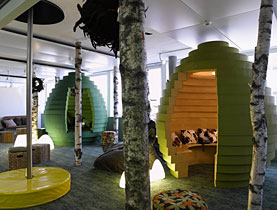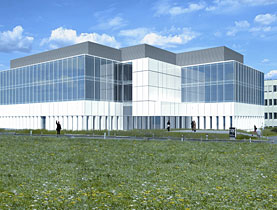Microsoft growth boosts Zurich’s “tech appeal”

Zurich's growing reputation as the Silicon Valley of Europe has been enhanced by the expansion of a Microsoft research laboratory producing cutting-edge technology.
The Microsoft Development Center opened new premises on Tuesday with staff numbers expected to quadruple by 2011. Google also expanded in the city this year and IBM is co-funding a nanotech laboratory.
Along with centres in Beijing, Hyderabad and the group headquarters in Redmond, Washington state, engineers in Zurich will develop Unified Communications (UC) software that brings telephony and video conferencing to computer desktops.
Much of the expertise was inherited from Zurich company Media Streams, which was taken over by Microsoft in 2005. The US computer software giant signalled its intent to keep the research in the city by unveiling the larger premises in the Wollishofen suburb.
“We’ve had great experiences working with the people at the Center in Zurich and they have produced amazing results, delivering high-quality products. There is no reason to stop something that is going so well,” Grace Chang, business manager of Microsoft’s Unified Communications Group, told swissinfo.
“We believe that to have a world-class global product we need to leverage top-class talent from around the globe. Zurich has well-established universities with excellent technology programmes that attract a lot of talent from around the world. By situating ourselves in their back yard, we have an opportunity to attract that talent to Microsoft.”
Silicon Valley
Earlier this year Microsoft announced a joint venture with Switzerland’s two Federal Institutes of Technology, in Zurich and Lausanne, to research the next generation of embedded software. Three years ago the company launched a Swiss software solutions centre at the technical college in Rapperswil.
The expanded Development Center has enough space to house an anticipated increase in engineers and other staff from the current 45 employees from 17 countries to 200 within three years.
In keeping with the current trend among IT multinationals to provide a creative working environment, the new office space comes complete with games room, fitness centre, library and external climbing wall.
Daniel Heinzmann, director of Zurich’s information technology department, told swissinfo that the expansion gave the city’s reputation a boost in the middle of the current financial crisis.
Message of hope
“It’s very exciting to see that Microsoft and their competitors in the IT world have decided to come here. We have a lot of very good professionals in Europe and we are now drawing them to Zurich to create a little Silicon Valley here,” he said.
“Much of our industrial sector is suffering because of the financial situation. This gives a message of hope, not just for IT, but for all industries.”
Microsoft’s Grace Chang said the decision to invest in UC applications came partly from the perceived need of companies to manage costs.
The ability to consolidate different methods of communication on one system would save businesses money, she said.
“The pressure caused by global economic change has resulted in enterprises putting more emphasis on cost cutting. UC technology actually addresses the cost of ownership issues,” Chang told swissinfo.
“Web conferencing will allow people to communicate with anyone around the globe and cut down on travel costs.”
swissinfo, Matthew Allen in Zurich
Microsoft has been present in Switzerland since 1990 and unveiled an innovation centre in Zurich in 2006, a year after buying Zurich-based company media-streams.com. It also has a presence in Geneva, Basel and Bern.
Earlier this year it announced it would pump $1 million (SFr1.2 million) a year for five years into a technology sharing arrangement with Switzerland’s two Federal Institutes of Technology to develop embedded software.
US internet search engine giant Google set up its European research and development centre in Zurich in 2004. It moved to a larger site in the city as staff numbers swelled from two to 400 in just four years. The current working space has the capacity to house twice that number.
IBM has been in Switzerland since 1956 and set up a research laboratory in Rüschlikon, Zurich, in 1962. The company is investing $60 million into a $90 million nanotechnology laboratory to be opened in Rüschlikon in 2011. This will be shared with Zurich’s Federal Institute of Technology.
The Institute agreed a deal with Walt Disney to set up a research laboratory in Zurich in October that will help develop the next generation of animations for the film giant.
Outside Zurich, internet services company Yahoo announced in March it would relocate its European headquarters from London to Geneva.

In compliance with the JTI standards
More: SWI swissinfo.ch certified by the Journalism Trust Initiative













You can find an overview of ongoing debates with our journalists here . Please join us!
If you want to start a conversation about a topic raised in this article or want to report factual errors, email us at english@swissinfo.ch.